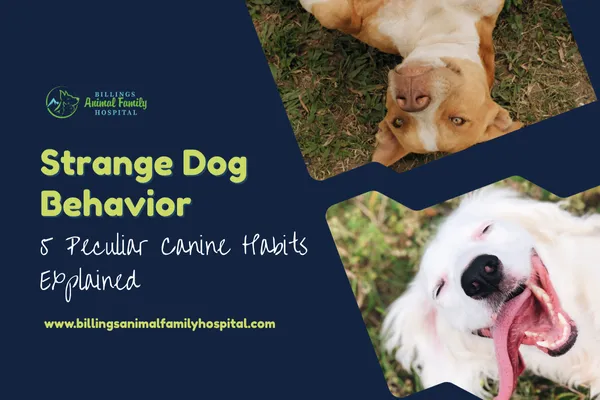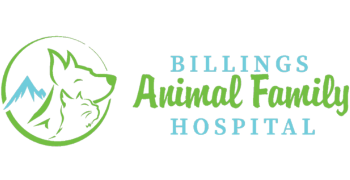
Strange Dog Behavior Explained | Billings Animal Family Hospital
Strange Dog Behavior: 5 Peculiar Canine Habits Explained
Dogs have an incredible sense of timing. Somehow, they manage to showcase their weirdest behaviors just when you’re introducing them to a new friend, jumping into a critical Zoom meeting, or bragging about how well-behaved they are. Coincidence? Probably. Hilarious? Definitely. But even when a dog is acting weird, there's often an explanation rooted in instinct, communication, or health.
At Billings Animal Family Hospital, we’ve seen it all, so today, we’re breaking down five types of strange dog behavior to help you understand your canine companion a little better.
What You'll Find In This Post . . .
Strange Dog Behavior: 5 Peculiar Canine Habits Explained
1. Humping away: When every day is “hump day”
2. All about that booty—butt sniffing in dogs
3. Rolling on dead things: A smelly mystery
4. The paw lift—some dogs need hand holding
5. Lick, munch, repeat: Dogs eat poop or lick everything
When strange dog behavior isn’t so strange after all

1. Humping away: When every day is “hump day”
Let’s tackle the elephant in the dog park: humping. It’s arguably one of the most awkward behaviors a dog may display, especially in front of guests. While it’s commonly associated with mating, that’s not always the case, especially if your dog is spayed or neutered.
Humping can be a sign of:
Overarousal or overstimulation
Excitement during play or social interactions
Anxiety or stress relief
Compulsive behavior
In these cases, your dog may be what we call “over threshold”, so emotionally stimulated that they can't think clearly or respond calmly. This often leads to repetitive behaviors like humping, jumping, circling, or barking.
While some of this odd behavior in dogs is harmless, others could indicate deeper behavioral or health concerns. In extreme cases, dogs may show aggression or become reactive. Read more about this strange dog behavior in: "Why Dogs Hump: Understanding Humping Behavior In Dogs."

2. All about that booty—butt sniffing in dogs
Forget nose-to-nose greetings, dogs prefer a more rear-ranged approach. Butt sniffing may seem like a weird dog behavior to us, but it’s actually part of normal dog behavior and excellent canine etiquette.
When dogs greet each other, they use scent glands near the rear to gather important information:
Reproductive status
Health
Age
Emotional state (such as fear or confidence)
So when your furry friend goes for the sniff, they're not being rude. They’re collecting data in the way their ancestors have for centuries.
Interestingly, a head-on greeting is actually considered aggressive in dog body language. So don’t be embarrassed by your dog’s “strange” behavior. It is simply top-tier communication!
Visit our article on "Deciphering Dog Body Language" to better understand how your dog may be expressing themselves through movement and posture.

3. Rolling on dead things: A smelly mystery
This one is as gross as it is mystifying. Why do dogs love to roll on dead animals, bugs, or poop right after a bath?
Theories abound, and while no one can be completely sure, here are the leading explanations:
This is mine — Some believe dogs roll to claim their discovery by covering it with their scent. However, this is unlikely since dogs typically mark territory using urine or facial rubbing, not their backs.
See what I found — Another theory suggests wolves roll in dead things to bring scent info back to the pack. But since they don’t usually lead others back, this explanation is questionable.
Blending in — The most widely accepted theory is that dogs roll to mask their own scent for camouflage. Smelling like prey helps them avoid detection by others.
Whatever the cause, one thing’s for sure: dogs love doing it. If your dog suddenly rolls in something foul, it’s likely an inherited instinct. Just keep that bath towel ready!

4. The paw lift—some dogs need hand holding
When a dog lifts their paw, it might mean different things depending on the context. This seemingly small gesture is one example of odd behavior in dogs that can signal anything from a desire for attention to uncertainty or emotional conflict.
If your dog places a paw on you without being asked to “shake,” they may be:
Seeking comfort or reassurance
Asking for attention or connection
Trying to appease or show affection
On the other hand, a dog holding their paw slightly above the ground while standing still may be expressing:
Uncertainty or inner conflict
Caution in unfamiliar situations
Mild stress or hesitation
In hunting breeds, this pose may also be part of pointing behavior. But in most cases, if a dog is acting weird by lifting a paw unexpectedly, it’s worth pausing to evaluate their emotional state.

5. Lick, munch, repeat: Dogs eat poop or lick everything
Let’s talk about one of the most puzzling—and unpleasant—strange dog behaviors: when dogs eat poop. Known as coprophagia, this behavior might seem downright gross to us, but for dogs, it can stem from instinct, nutritional imbalances, or behavioral triggers.
Here are a few common reasons dogs eat poop:
Motherly instinct – Nursing moms lick and clean their puppies by consuming their waste to keep the den clean.
Nutritional deficiency – Some dogs may lack enzymes or nutrients, leading them to seek them out in feces.
Attention-seeking – Dogs quickly learn that poop-eating gets a big reaction from humans.
Boredom or anxiety – A dog left alone too long or without stimulation may develop this behavior as a coping mechanism.
Similarly, constant licking can also signal anxiety, nausea, allergies, or compulsive behavior. Occasional licking is normal dog behavior, but if your dog is licking excessively, it could be a sign that they need veterinary attention.
If your dog’s licking or poop-eating habit is becoming frequent, it’s best to schedule a pet wellness exam with your veterinarian to identify any underlying issues. These behaviors may seem weird or silly, but they can sometimes indicate deeper physical or emotional needs.

When strange dog behavior isn’t so strange after all
Dogs are quirky, funny, and full of surprises. What may seem like strange dog behavior to us is often a normal, instinctual response for them. Still, it’s crucial to understand when that behavior crosses into concerning territory.
If your dog is acting strange, showing new behaviors, or suddenly becoming reactive, don’t wait. Let our compassionate team at Billings Animal Family Hospital help you get to the bottom of it. From behavior consultations to full-service care, we’re your go-to vet in Billings, MT.
Call us at (406) 245-4772 or contact us here for guidance, appointments, or emergencies.




